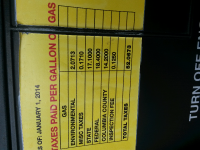Copperhead
Veteran Member
Well, when the engine is actually designed around E85 as opposed to trying to make an engine that wasn't, use it, then the dynamics change a little.
To wit, the 3.2L V6 EBDI engine that is a co-development of GM and the British engine designer Ricardo. It is being tested in some of GM's 2500 and 3500 HD pickups. Now, that 3.2L gets as much HP and Torque as the 6.6L Duramax diesel and better fuel economy as well, and does it on...... E85. There is a lot of articles and a few youtube videos out there on this engine. Not sure of any timeline when it will make it out as an option in production pickups. Seems to always take about 10 years from prototype to production.
Yeah, there is a lot of politics and finger tickling that went on with how ethanol came to be a big player in the fuel game. But it is what it is. Now, I just wish the OEM's would get off their backsides and develop more engines that take advantage of it and then the consumer will still win in the long run. And ethanol is a substantially cleaner burning fuel, when the engine is made to take advantage of it.
Lots of folks like to demonize the ethanol folks regarding this, and to be sure, they are not as pure as the wind driven snow. But the primary blame has to be laid on politicians. Knowing full well that blends of ethanol get lower mpg in regular production gas engines, they promoted this because fuel taxes are based on a per gallon thing. The more fuel sold, the more fuel taxes. It really is all that simple, folks. No Geraldo Rivera, conspiracy stuff. The ethanol producers just hopped on the wagon for the ride. Now that it is the cards that are dealt, we just need to know how to play them to our advantage. And getting engines out in the market that take advantage of this stuff would really be a nice ace up the sleeve.
To wit, the 3.2L V6 EBDI engine that is a co-development of GM and the British engine designer Ricardo. It is being tested in some of GM's 2500 and 3500 HD pickups. Now, that 3.2L gets as much HP and Torque as the 6.6L Duramax diesel and better fuel economy as well, and does it on...... E85. There is a lot of articles and a few youtube videos out there on this engine. Not sure of any timeline when it will make it out as an option in production pickups. Seems to always take about 10 years from prototype to production.
Yeah, there is a lot of politics and finger tickling that went on with how ethanol came to be a big player in the fuel game. But it is what it is. Now, I just wish the OEM's would get off their backsides and develop more engines that take advantage of it and then the consumer will still win in the long run. And ethanol is a substantially cleaner burning fuel, when the engine is made to take advantage of it.
Lots of folks like to demonize the ethanol folks regarding this, and to be sure, they are not as pure as the wind driven snow. But the primary blame has to be laid on politicians. Knowing full well that blends of ethanol get lower mpg in regular production gas engines, they promoted this because fuel taxes are based on a per gallon thing. The more fuel sold, the more fuel taxes. It really is all that simple, folks. No Geraldo Rivera, conspiracy stuff. The ethanol producers just hopped on the wagon for the ride. Now that it is the cards that are dealt, we just need to know how to play them to our advantage. And getting engines out in the market that take advantage of this stuff would really be a nice ace up the sleeve.

